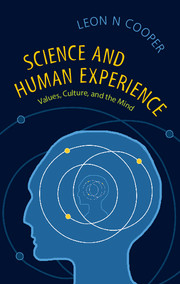Book contents
- Frontmatter
- Dedication
- Contents
- Preface
- Acknowledgement
- Part One Science and Society
- 1 Science and Human Experience: (Mephistopheles Is Alive and Well and Living in the Space Age)
- 2 Does Science Undermine our Values?
- 3 Can Science Serve Mankind?
- 4 Modern Science and Contemporary Discomfort: Metaphor and Reality
- 5 Faith and Science
- 6 Art and Science
- 7 Fraud in Science
- 8 Why Study Science? The Keys to the Cathedral
- 9 Is Evolution a Theory? A Modest Proposal
- 10 The Silence of the Second
- 11 Introduction to Copenhagen
- 12 The Unpaid Debt
- Part Two Thought and Consciousness
- Part Three On the Nature and Limits of Science
6 - Art and Science
from Part One - Science and Society
Published online by Cambridge University Press: 05 November 2014
- Frontmatter
- Dedication
- Contents
- Preface
- Acknowledgement
- Part One Science and Society
- 1 Science and Human Experience: (Mephistopheles Is Alive and Well and Living in the Space Age)
- 2 Does Science Undermine our Values?
- 3 Can Science Serve Mankind?
- 4 Modern Science and Contemporary Discomfort: Metaphor and Reality
- 5 Faith and Science
- 6 Art and Science
- 7 Fraud in Science
- 8 Why Study Science? The Keys to the Cathedral
- 9 Is Evolution a Theory? A Modest Proposal
- 10 The Silence of the Second
- 11 Introduction to Copenhagen
- 12 The Unpaid Debt
- Part Two Thought and Consciousness
- Part Three On the Nature and Limits of Science
Summary
Why is art often thought of in opposition to science? We do both a disservice by focusing on their differences while neglecting their similarities. Is it possible that at a deep level these two have similar goals?
This essay is based on an article originally published in the journal Daedalus, 1986, vol. 115(3).
We might ask why this question of the difference between art and science is posed. Why are we not talking about the similarities or differences between a painter and a musician, or between a sculptor and a poet? Why is the distinction between the scientist and the artist of special concern? I would like to suggest that this is less an intellectual than a sociological question. It is perhaps because, unfortunately, more and more people who call themselves scientists live, think, and work in a different part of society, both intellectually and socially, from the part inhabited by those who call themselves artists.
There are indeed enormous differences of style in science. Yet, one characteristic of science is that the way things are said in science is almost always less important than what is said, whereas the way a concept is expressed in art is almost always more important than what is expressed.
There is a vast difference between science being created and science being presented (in textbooks, for example). For science being created, I see a closeness between art and science.
- Type
- Chapter
- Information
- Science and Human ExperienceValues, Culture, and the Mind, pp. 59 - 63Publisher: Cambridge University PressPrint publication year: 2014



